#messages from a wannabe historian
Text
An Amused Rant
The Ban Hammer Has Fallen
I discovered this morning that I have been unceremoniously banned, booted, kicked to the curb by the “site owner” of the Napoleonic Wars Forum. No preliminary personal email warning to shape up, no admonishment on the site that further infringements on the site’s “rules” would result in disciplinary action. Just a message when I tried to sign on: “Access denied by site owner.”
As some folks more famous--or infamous--than I have said: “I’ve been thrown out of much better places.” This is very true here.
This site is the “successor” to Bob Burnham’s long-running and very popular Napoleon Series, which had a forum to die for: a wealth of threads each and every day, a multitude of participants from all areas of interest in the Napoleonic Era, and all national perspectives, historians of repute and academic wannabes, wargamers and re-enactors, and just plain fans of the period. Every day featured between 30 and 50 new posts on new threads or existing ones, and some of the latter looked like an Amazon python twisting itself into knots. We all had fun. We all argued and disagreed and agreed and argued some more. The sheer amount of knowledge among all participants, casual and fanatic, was truly amazing.
The day came when Burnham decided he didn’t want to be involved with revamping the website, and passed the reins to someone else. Because Burnham was an Anglophile, the type who adored the British Army right down to the buttons on their gaiters, we weren’t too surprised that the website recipient was himself British. But...
The “new” forum lost just about every former member right from the beginning, and as it struggled forward, it lost even more, until, for the past year, less than a dozen folks bothered to post anything regularly. Days would pass with nothing new. Why was this?
I suggest this because the “site owner,” an avowed Anglophile who determined that his site would be a celebration of all things Wellington and Waterloo, was simply too inexperienced in managing such a site, and certainly inexperienced in the totality of the Napoleonic Era outside the borders of the British Isles, other than the ubiquitous Peninsula, or course, or the interminable naval battles. He expanded into podcasts featuring topics by his tiny circle of questionable personages: an undistinguished gentleman who wrote a book—one!—about the British soldier under Wellington and persuaded five US Army psychiatrists to read dubious memoirs and letters taken out of context to pronounce Napoleon a narcissist and megalomaniac bent on world domination; a woman who holds forth at a Belgian university and whose expertise is in modern terrorism but tries rather desperately to transform Napoleonic France into a terrorist state; an otherwise charming Scot lass who describes herself as a “fan” and holds forth on the various Napoleonic marshals after having read a couple of secondary sources in English; and another nice but thoroughly British young man whose expertise is—wait for it!—the British Army from 1700 through 1855.
The owner uses these folks repeatedly as experts on his podcasts, And lest the unwary should wander in, the titles should be a warning. One of the more recent in an unfortunate series entitled “Napoleon’s Marshals: Boney’s Boys in Spain” alerts one immediately to the slant. Another series announced itself thus: “New Series: The Peninsular War – Origins. In the first installment of a new series [ Blank] and I discuss how the Peninsular War managed to explode seemingly out of nowhere in 1807-08, why Bailen was a dream, why Murat was an idiot, and why the Brits weren’t really interested...at least initially.” I can imagine this blurb should make some of you squirm at the mistakes and the biases, but that’s what you get when the talking heads are so very incompetent.
I admit since the first year of this pitiful site’s existence I rarely bothered commenting. But as time passed and it became increasingly inane, Brit-centric, and paltry, my clamoring snarky side came out. I knowingly violated the “...be kind!” pronouncement. I trashed the site owner as an academic wannabe whose terminal degree was in “Research,” and dissected the pretensions of his coterie of podcasters. I pointed out that they were all linguistically deficient, thus relying on English language secondary sources and unfamiliar with European archives. I referred to the site owner as definitely third-tier in all his endeavors.
And all that was after some severe self-editing.
But I am proud to have been removed from such a cesspool of mediocrity; I was beginning to spend too much time snarking when I could be doing something more useful and uplifting.
21 notes
·
View notes
Text
Next series
The next series of screenshots has been decided upon! Expect some screenshots later this afternoon from Ned Kelly!
7 notes
·
View notes
Text
I LIVE ON
Hey followers! I finally set up a new blog on my other account, so it’ll be easier to upload! My new blog is @extrahistory-outofcontext and I have started posting screenshots from non-Euclidean geometry! Follow me there!
12 notes
·
View notes
Text
Downward Christian Soldiers

Father Charles Coughlin, 1930s
On January 14 1940, the FBI arrested 18 men in New York City accused of plotting the overthrow of the U.S. government. Fourteen were snatched up in their homes in Brooklyn, the others in The Bronx and Queens. Searches yielded more than a dozen Springfield rifles, a shotgun, some handguns, thousands of rounds of ammunition, and the materials for homemade bombs. J. Edgar Hoover said they were plotting a terrorist campaign targeting transportation, power, and communications facilities; their goal was to rouse the military into staging a coup, placing a strong dictator like Hitler or Mussolini in power, and cleansing the country of Jews.
The men were mostly of German or Irish descent, and ranged in age from 18 to 38. If employed (a few weren’t), they held low-end jobs, including an elevator mechanic, a telephone lineman, a chauffeur, a couple of salesmen, a couple of office clerks. The 18-year-old was a student. Most troubling was the fact that six of them were National Guardsmen.
They were all followers of a Father Coughlin-inspired movement called the Christian Front. In his mid-1930s heyday, Coughlin was arguably the most powerful pro-Fascist voice in America. An Irish Catholic originally from Canada, he had first turned to radio in the 1920s simply as a way to expand his ministry beyond his tiny congregation in Royal Oaks. He had a strong radio voice, and when CBS started syndicating his weekly sermons in 1929 it was an instant success. The crash and start of the Depression politicized him. His condemnations of Wall Street and President Hoover brought him tens of thousands of fan letters a week, and his high praises for Hoover’s opponent FDR surely had an impact on the 1932 elections. Then, when the invitation he craved to sit among President Roosevelt’s circle of advisors didn’t come, he turned bitter as a jilted lover. He began denouncing Roosevelt, his New Deal, his Jew York advisors, and his friends in the labor movement as all facets of an international Jewish-Communist conspiracy to destroy Christianity and democracy. He also praised Franco, Mussolini, and Hitler for defending their people against this spreading evil.
Coughlin’s call for a “Christian Front” to combat the Communists’ mid-1930s Popular Front coalition with other groups on the left resonated with the Depression-driven anger and paranoia of many Americans, especially in cities like Boston and New York with large communities of lower- and lower-middle class Irish Catholics, who tended to be shut out of other right-wing movements precisely because they were Irish and Catholic. At his peak, Coughlin had tens of millions of listeners to his Sunday radio sermons, a million readers of his weekly magazine Social Justice, and received millions of dollars in small donations.
By 1938, rabid anti-Semitism had become the centerpiece of Coughlin’s message. That year, at a Christian Front rally in The Bronx, he allegedly gave the Nazi salute and declared, “When we get through with the Jews in America, they’ll think the treatment they received in Germany was nothing.” In Social Justice he reprinted the anti-Semitic hoax The Protocols of the Elders of Zion, which also topped Henry Ford’s list of favorite reading. In the autumn of 1938, when Coughlin said the Jews had brought Kristallnacht on themselves, radio stations, including WMCA in New York, dropped him. Several thousand Fronters “picketed the station, its advertisers, and Jewish-owned stores throughout the city,” historian Robert A. Rosenbaum writes. “The pickets returned every Sunday afternoon for many months. In the meantime, gangs of Christian Fronters roamed the streets and subways, peddling copies of Social Justice, distributing anti-Semitic leaflets, and orating on street corners, while harassing and assaulting people they took to be Jewish.” The city’s police force, which was nearly two-thirds Irish, turned a blind eye; some number of them were Christian Frontiers themselves.
The Front thrived in parishes in all of New York City’s boroughs. Some of the first Front meetings took place in a church hall near Columbus Circle, and some of the most frequent and well-attended were in The Bronx. In Brooklyn, Father Francis Joseph Healy, the pastor of the St. Joseph’s parish in Prospect Heights, was also the editor of the Brooklyn diocese’s weekly paper, The Tablet, which he made a platform for extremely anti-Communist, pro-Fascist, and pro-Coughlin thought. After Father Healy’s death in 1940, his managing editor Patrick Scanlan continued the paper’s reactionary slant. Scanlan ran Coughlin’s rants on the front page. Healy’s successor at St. Joseph’s, Father Edward Curran, was also a major supporter of Father Coughlin and other pro-Fascist and isolationist groups. During the war in Spain Father Curran wrote dozens of pro-Franco columns for arch-conservative publications around the country.
By 1939 small cells of Fronters in Manhattan and Brooklyn were calling themselves “sports clubs,” though the only sport they practiced was target shooting at rifle ranges. The Guardsmen in the group evidently pilfered the rifles and ammo from their posts, and trained other Frontiers in how to use them.
Along with the cops and Guardsmen, the Front cells were also peppered with spies. The FBI had informants keeping tabs on them. Two independent investigators would write very successful books in which they claimed to have infiltrated the Front as well, and dozens of other underground hate groups. Richard Rollins’ I Find Treason would be published by William Morrow in 1941; John Roy Carlson’s similar Under Cover would be a runaway bestseller for E. P. Dutton two years later, galloping through 16 printings in its first six months. Both writers used pseudonyms. Carlson was actually Arthur Derounian, an Armenian immigrant. Rollins was apparently Isidore Rothberg, an investigator for Congressman Samuel Dickstein of the House Special Committee on Un-American Activities. Partly because the writers used pseudonyms while naming scores of individuals they claimed were pro-Hitler and pro-Fascist, both books were widely denounced on the right as fabrications and smear campaigns.
Derounian wrote that he was riding the subway one day in 1938 when he picked up a leaflet of “bitterly anti-Semitic quotations” published by something called the Nationalist Press Association on East 116th Street in Italian East Harlem. He decided to research, and found himself exploring a vast underground world of wannabe Hitlers and Mussolinis, society matron super-patriots, racists, Anglophobes, White Russians, and assorted conspiracy theorists and kooks.
Born in 1909, Derounian had grown up in another world of hate. After struggling to stay alive as Armenians in Greece at a time of chaos and slaughter in the Balkans, his family fled to New York in 1921. Arthur learned English and earned a degree in journalism at NYU in 1926. In 1933 he learned that the turmoil in the Balkans had followed him across the ocean, when the archbishop of New York’s Armenian Orthodox Catholics, while serving Christmas Mass in his Washington Heights church, was stabbed to death by radical Armenian nationalists opposed to his politics.
So when Derounian read that hate sheet on the subway in 1938, he was primed to follow up. The 116th Street address was an old tenement with a barber shop on the ground floor. The Nationalist Press “office” was a dingy back room stacked to the stained ceiling with right-wing books, newspapers and pamphlets. Poking around in the gloom were a few Italian men and Peter Stahrenberg, a tall blond Aryan type “with blunt features and a coarse-lipped, brutal mouth,” who wore a khaki shirt and a black tie with a pearl-studded swastika tie tack. Stahrenberg was the publisher of the National American, a pro-Hitler newspaper whose striking logo was an American Indian giving the Nazi salute before a large swastika. He was also the head of the American National-Socialist Party. Derounian, calling himself George Pagnanelli and expressing interest in the “patriotic movement,” wormed his way into Stahrenberg’s confidence.
As he explored Stahrenberg’s twilight world, Derounian claimed, he found pro-Nazis and pro-Fascists all over New York City, holding meetings and rallies in every borough. It was a topsy-turvy world where street thugs from the city’s poorest neighborhoods mingled with wealthy Park Avenue crackpots, and Irish Catholic Fronters convinced that Communism was an international Jewish plot sat in the same meetings with Protestant zealots convinced that the Vatican was a Jewish front. He met rabidly anti-Communist D.A.R. socialites, and retired military officers who were certain that FDR and the Jew Dealers were leading the nation to ruin. He met the prominent conservative organizer Catherine Curtis, introducing himself as George Pagnanelli; she kept calling him Mr. Pagliacci. He even found black pro-Nazis in Harlem. Some were attracted by Hitler’s anti-Semitism; others simply cheered the idea of a white man making trouble for other whites.
When the Christian Front clique was arraigned in Brooklyn’s federal courthouse in February, they all pleaded not guilty to charges of conspiracy and theft of government property. The lawyer for 12 of them was Leo Healy – Father Healy’s brother. A crowd jeered and booed as they were perp-walked into the courthouse. Winchell and La Guardia both derided them as “bums,” La Guardia adding that if they were the best the enemies of democracy could muster, no one need lose any sleep. But the defendants also had their sympathizers. Father Curran was the keynote speaker at a large rally in Prospect Hall to express support for them.
Fourteen defendants were left when the trial began in April; one of the original 18 had committed suicide, and charges against three others were dropped. As the trial sputtered along through May, it began to appear that the FBI and prosecutors hadn’t built a very strong case. When the proceedings stumbled to a close on Monday June 24, the jury acquitted nine of the defendants and pronounced themselves hung on the other five.
It was a major embarrassment for Hoover. The Front and their supporters cheered it as a great victory, and would continue to spread hate and violence well into the war years. Through 1942 and 1943 there would be numerous reports in the press of roving gangs of young men, mostly identified as Irish and affiliated with the Front, beating and sometimes even knifing Jews in neighborhoods like Flatbush, Washington Heights and the South Bronx, where Irish and Jewish communities abutted. Many shops, synagogues and cemeteries were vandalized. Jewish leaders pleaded with Mayor La Guardia and Police Commissioner Valentine, but they took little action.
Coughlin would rant on into 1942, when the federal government shut down Social Justice as a seditious publication, and the Archbishop of Detroit finally ordered him to stop all political activity. Father Curran, however, continued undeterred, making anti-Semitic, anti-war speeches to Frontiers and others through the entire war.
by John Strausbaugh
9 notes
·
View notes
Note
I totally like your Severus x Evelyn AUs a lot. Since you are accepting suggestions... how about a AU in which Evelyn is a witch? I am very curious about what you have in mind for this AU.
Hello, Anon!
I´ve gotten a similar question a private message last week (maybe it was you? :D ) and I´ve been thinking about it since, which is why I still haven´t answered.
I think to know what this AU would be like, we would have to take a few variables into question: is Evelyn´s life exactly the same, except for her being a witch? Is Severus a wizard or a muggle (in which case it would be a reverse AU type thing)?
For the sake of simplicity I´ll lay down some assumptions:
In any scenario Evelyn is a witch, everything else remains the same: she´s still Marius Black´s granddaughter, her older brother Paul is still a wizard, she´s still the daughter of muggle parents.
Now things about witch!Evelyn that would be the same in any scenario:
1-She´s sorted into Ravenclaw.
2-She´ll be the cause of some awkwardness given that she just happens to be a muggle-born witch who´s also a member of the Black family. Her very existence would challenge the narrative of the Black family purity. The ramifications of that would be interesting, specially considering she´d be in the younger side of the Sirius, Regulus, Narcissa, Andromeda and Bellatrix generation of Blacks. It´s safe to say she would distance herself from the Black family as much as she could and they wouldn´t want to have anything to do with her either (except maybe for Sirius, but I don´t see her gravitating towards him as a friend on the basis of their personalities and behaviour being entirely incompatible.).
3-Evelyn´s vocation is teaching and academic work. That´s a basic personality trait of hers, and as a witch it wouldn´t change. So she would certainly teach History in Hogwarts and be a Historian just like she is in “Post War”. I can even see her being a pupil or even research assistant toBathilda Bagshot.
Here are some of the scenarios I thought (I´ll try to keep them brief)
Severus is a muggle/squib and Evelyn a witch: I´m starting with this one because I think it´s the scenario in which their meeting is the less likely. Evelyn is very close to the muggle side of her family and would avoid much contact with the wizarding Blacks, so I imagine she would spend a lot of time among muggles, even as a witch. There´s a chance she and Severus would meet, but I find it unlikely. Could happen though. Maybe it happens through the house in Cokeworth like it did in “Post War”, but I don´t know if muggle Severus would be living in Cokeworth as an adult.
Severus is the same as canon, but Evelyn is a witch:
I believe what defines their relationship here is whether Evelyn´s brother, Paul, is alive or not.
If Paul is deceased, then I don´t think Severus and Evelyn would interact much as students in Hogwarts. Evelyn would be three years behind Severus, and they´d be in different houses. I definitely don´t see Evelyn as being a part of the Marauder “fanbase” as I imagine she would quite dislike them, but I also don´t see her being super close to Severus. She would feel bad for him, and if she were ever there to witness the Marauders ganging up on him (or any other of the students they bullied) she might object; but these are older students, and I don´t see her having the agency or ability to do much about it. Once they grow up, however, that´s where things get interesting. They´d be working in Hogwarts, and given their similar tastes and inclinations (both were raised among muggles, both enjoy similar books, art and music, both have a similar tendency to snark) they could become good friends, and maybe something more depending on how things play out.
If Paul is alive… Ok, this one I REALLY like. Because Paul and Severus would be in the same house, and Paul would be a year behind Severus (maybe in the same year as Regulus, memory fails me as to Regulus exact age at the moment). Paul would be a muggleborn, and Severus a Half-blood, and in the environment of Slytherin they may gravitate towards each other. As a muggleborn, Paul would most certainly not be welcome into the circles of wannabe Death Eaters (not that he would be in any way inclined to join), and he would certainly be an issue for the Black family (much like Evelyn would as well.). He would be a Slytherin so Sirius and the Marauders might disregard him being a muggleborn and related to Sirius and just group him with all the Slytherins as “fair game” for bullying (a problem, Evelyn as a Ravenclaw might not have.). Maybe all those things combined could make Severus gravitate towards him, and Paul could be another positive, friendly presence in his life,aside from Lily (maybe a more effective one, given they´re in the same house and thus spending more time around each other). If Paul and Severus become friends (finding some sort of kinship in that both have the Marauders harrassing them, and neither is a Pureblood in a house that has a lot of purebloods), then he would have a relatively closer connection to Evelyn once she comes to Howarts (or even before that).
And knowing Paul and Evelyn´s parents, the moment they find out Paul has a friend, who´s not in a very good situation in life, so to speak, Severus would certainly be more than welcome in their home (much like they welcomed Fin, Evelyn´s friend when he came out to his family). So maybe something would have happened between Severus and Evelyn earlier, while they were still at school, because you know, Severus is hanging around and all? Any way it plays out with Evelyn, I´d just love to see young Sev spending some well deserved summer vacations in the Irish countryside going fishing with Lyn´s dad and grandad and having her mom feed him her legendarily delicious food. Poor lad needed some family lovin´. If he gets a girlfriend out of it, that´s even better, lol!
#ask#snape#snape AU#pro snape#reverse AU#Witch!Evelyn AU#What if Paul was alive AU#Sevelyn AU#rambling#long post#self-indulgent
7 notes
·
View notes
Text
The Outer Limits - ‘The Zanti Misfits’ Review

Prisoners from the planet Zanti are sent to Earth for incarceration, and things do not go well.
I really like this one, despite its ultimate and very Outer Limits message – that humans are not only bad, we're really, really bad. In fact, we're such "practiced executioners" that our lethal behavior is predictable by aliens.
But this episode gets big points for discussing a critical and almost insoluble problem: how does a society deal humanely with its criminals? Rehabilitation, prison, the death penalty, all are imperfect solutions. The Zantis claimed that they were incapable of executing members of their own species. Why? Some sort of biological imperative, since they were also capable of tricking another species into doing it for them?
We expected the Zantis, when they finally showed up, to be monstrous. The surprise was that they were small – like rat-sized ants with human faces. It's really a tribute to how well this show creates tension that we didn't laugh at their appearance – hey, a few cans of Raid, some big shoes, no problem, right? Instead, the story played successfully on our fears of big, hairy bugs, of a horde of insects on the attack. Those huge bugs gave a pretty good account of themselves during that tense battle at the base. The Zanti crawling under a soldier's pants leg was inspired, too. Who hasn't been freaked out by that?
Our lead, Stephen Grave (Michael Tolan) got to be all upright and heroic and a foreign correspondent wannabe, rescuing the damsel in distress and everything. But a young Bruce Dern stole the show as Ben Garth, a human misfit, a bad guy on the lam who very nearly destroyed our world just by crashing the gate to the facility and... being bad. How Ben Garth and the unfortunate Lisa and all that money in the glove box wound up in the middle of nowhere wasn't explained, but it sure enlivened the story. And I absolutely loved how Dern curled up his body like a dead bug after the Zantis killed him.

Lisa (Olive Deering), the unhappy housewife who ran away with Garth, was a discordant note in what was otherwise a terrific episode. She kept whining about her boring life, or wildly gesticulating with fear, or falling in the dirt and sobbing helplessly. Was it a poor performance, or was she simply doing her best with what was written for her? And hey, it was the desert and everyone was sweating, but Lisa was wearing a fur coat. Seriously? I realize it was a character statement, but still.
I don't have much to say about the soldiers, who with the exception of the compassionate General Hart, came across as cold and inhuman. I'm sure that was supposed to demonstrate the point that the Zantis made. During one scene, the soldiers were all standing there motionless and expressionless as they listened to Garth dying, screaming for help. Of course, Garth did just kill one of their own, but still.

The photography in this episode was exceptional, and it wasn't just the stop-motion Zanti bugs. Not only did they give us an old West ghost town called Morgue, complete with tumbleweeds and reminiscent of those fifties monster-bug movies, but they also heavily featured the stark, gorgeous Vasquez Rocks, a site north of Los Angeles used often in filming – most notably in another sixties classic, the original Star Trek.
There was clever prison-bar imagery throughout the episode, too: action scenes shot through the spidery branches of leafless trees, the weirdly inappropriate beaded curtain in the military base's office, the vertical glass panels covered with decorative diamond shapes. And the Zanti ship looked very much like a white cowboy hat. Was that deliberate?

Bits:
— There's a delightful bit of foreshadowing early on when Grave sees a large ant on a wooden post and flicks it away.
— General Hart initially used the word "destroy," but later used the word "destruct" instead. As in "Destruct the ship." It just stood out to me, so I mentioned it.
— Stephen Grave's official title was "Historian of Interplanetary Events." He must have gotten the job because his father was a friend of General Hart's. Nepotism is everywhere.
— At one point, Garth stared at the back of Lisa's head. The way the camera focused on the swath of hair and the barette holding it back made her look alien.
— How did the Zantis kill? Bites? Poison?
— Points for using a computer to translate messages from the Zanti, instead of having the aliens speak English.
— When I lived in Los Angeles, I kept planning to go visit Vasquez Rocks, but never got around to it because it was quite a drive. I always regret that I didn't do it when it pops up on television. Maybe when I get out there to visit someday...
— "The Zanti Misfits" was written by Outer Limits producer Joseph Stefano, who also wrote the screenplay for Hitchcock's Psycho.
Quotes:
Grave: "History has been recorded in some pretty morbid places, Major. But when a historian named Grave finds himself in a ghost town called Morgue..."

General Hart: (discussing the use of automation instead of soldiers) "Of course, computers don't bleed."
Ben Garth: (explaining why he ran down the guard at the gate) "I would never kill a reasonable man."
Excellent episode. Four out of four inappropriate fur coats,
Billie Doux loves good television and spends way too much time writing about it.
5 notes
·
View notes
Text

How do Trump's extraordinary betrayals stand up against history? He could be the worst.
Putting Trump in context is the best way to highlight and understand his betrayals. History is the highest court, and its verdict can't be appealed.
— David Rothkopf, Opinion Columnist | October 27, 2020 | US Today
It is not a small thing to call the president of the United States a traitor. But it is an even greater offense to fail to call him one if he has betrayed his country as often and as egregiously as Donald Trump has done.
As the depth of Trump’s active collaboration with Russia became clear in 2016 and 2017, as he was revealed to be surrounded by men who were compromised by their ties to Russia, as he orchestrated a cover-up of his wrongdoing, fired and impeded those who would investigate it and serially rewarded Russia for its efforts on his behalf, it was not uncommon to hear critics apply strong labels to what the president had done. Trump himself has applied the word "treason" almost casually to his political enemies.
But treason is very narrowly defined by the Constitution. Article III specifies, “Treason against the United States, shall consist only in levying war against them, or in adhering to their enemies, giving them aid and comfort.” While it is undoubtedly true that Trump has adhered to a foreign adversary, Russia, and has given it much aid and comfort, the courts have determined that an enemy can only be a country against which we have declared war. That is an antiquated idea in a time during which undeclared wars are far more common and cyber conflict, for example, may be an almost permanent feature of an international relationship. But it is binding.
Trump has repeatedly betrayed US
That said, the dictionary definition of a traitor is “a person who betrays a friend, country or principle.” There is no doubt that Trump has betrayed the country time and time again. It is a matter of public record that he encouraged our Russian adversaries to become involved in the 2016 election. When the intelligence community provided evidence of the threat posed by Russia, we saw Trump dismiss it, ignore it, fail in his duty to “preserve, protect and defend.”
We have seen him use the power of his office to reward and celebrate the Russians and to condemn Americans in the CIA and the FBI and elsewhere who would seek to impede the Russian attacks on our democracy. We have watched him undermine the rule of law in the United States and alter U.S. policy in ways that empowered the Russians and, specifically, enabled them to interfere yet again in our elections.
Relentless adversary: Russia never stopped trying to sway elections and sow mistrust. Best thing to do is vote.
The Russia betrayal is the original sin of the Trump presidency. And since Russian President Vladimir Putin helped Trump win office, not a week has gone by that we have not been confronted by its consequences — attacks on our allies, classified information handed over in the Oval Office, hacks put atop the intelligence community to suppress warnings about Russia, messages from the president validating Putin propaganda over the findings of U.S. national security professionals, embracing Russian positions on issues like Ukraine, giving Russia a free hand in Syria, pulling out of the Intermediate-Range Nuclear Forces Treaty in a way to give Russia more freedom to develop its defenses.
Investigations into this betrayal have been quashed. But the facts — close ties between Trump and his team with Russians and (in the case of people like Paul Manafort and Rudy Giuliani) direct interaction with known Russian intelligence operatives — have been established.
There have been other betrayals, of course: Rewarding foreign despots who might benefit Trump businesses. Every corrupt act of placing self-interest ahead of the national interest. Seeking to pressure Ukrainians into helping defeat a potential political adversary, the act that led to Trump’s impeachment. Placing personal political fortunes ahead of the lives and well-being of hundreds of thousands of Americans, now victims of the COVID-19 catastrophe.
Trump has betrayed the country again and again. And there has been a massive effort by him and his political allies to quash this truth, to cloud perceptions with disinformation, to claim critical elements of it were a hoax. To defend the country, to ensure the survival of our democracy and to ultimately undo the damage Trump and Putin and their enablers and cronies have done, it was essential that the facts be brought to light.
But how could that be done in a way that would stand up to scrutiny and stand out amidst the daily outrages of the Trump presidency? As a historian and a student of the presidency and of power, I know that history is the highest court, that its jurisdiction knows no boundaries and that its final verdict cannot be appealed. Further, I understood that it was essential not to allow Trump’s serial betrayals to become somehow “normalized” or devalued in the acid back and forth of our daily political debate.
Trump in historical context
The best way to convey the extraordinary nature of Trump’s abuses and the damage he has done is to let the facts speak for themselves against the backdrop of history. It is essential to objectively ask, how do his acts compare with those who have come before him? Where does he stand alongside Benedict Arnold, Aaron Burr, Jefferson Davis, John Brown, the Rosenbergs, Aldrich Ames, Robert Hanssen?
Each of their stories is different (Brown, convicted and hanged for treason, was a mistreated hero; Arnold was an American war hero before he became our most notorious traitor). But by placing Trump among them, as I have done in my new book, “Traitor: A History of American Betrayal from Benedict Arnold to Donald Trump,” we can see what he has done in context, dispassionately, set apart from the spin and the apologists.
Retired Marine generals: Trump's dangerous isolationism weakens America and strengthens our adversaries
The 2020 election presents us with an existential choice. If we reelect this wannabe authoritarian, this puppet of foreign autocrats, he and they will be not just validated but empowered. Whatever Trump’s motivation, we have seen him remake our judiciary and undermine our system of justice. He has degraded America on the global stage and profoundly weakened us.
All that is the price of his betrayals to date. Should he be given four more years to carry them forward, our democracy might never recover. We must see him for the traitor he is and see that because of the high office he held and his complete absence of character or care for the country, he may well be the worst of all those who have betrayed America in the past.
David Rothkopf (@djrothkopf) is host of "Deep State Radio" and CEO of the Rothkopf Group media and podcasting company. His new book, "Traitor: A History of American Betrayal from Benedict Arnold to Donald Trump," is out Tuesday.
— You can read diverse opinions from our Board of Contributors and other writers on the Opinion front page, on Twitter @usatodayopinion and in our daily Opinion newsletter. To respond to a column, submit a comment to [email protected].
0 notes
Text
Studyblr Introduction
It’s been a few weeks and I haven’t done one of these yet so it’s probably about time!
About me
My name is Romy, I’m a 21 year old student from the Netherlands. This means English is not my native language. Even though I feel like I’m doing well, I would like to become much better at it so feel free to send me a (kind) message if I mess up the English language. I made this studyblr to give me extra motivation and feel less guilty while procrastinating every once in a while!
My study
I’m a history major and these are my classes this semester:
History of representative government
French revolution
History of Russia
The prosecution of Dutch Jews in WO II and the consequences
Study of Islam
Philosophy of science
Digital history
I take a few extra classes so it’s going to be a busy year!
Extra
I like to do a lot of things! But right now I’m spending most of my time on these things:
Spending time with my housemates (I’ve got 14 of them!)
Partying (probably more than most studyblrs)
Writing for a dutch journal
Writing in general (yes, I want to write a book one day)
My favourite studyblrs/tumblrs
@emmastudies @post--grad @wittyhistorian @platosnotes @fiercelittlestudyblr @getshitdonetbh @theologianstudies @mattystudies @liberalartssociety @studystory @studydiaryofamedstudent @caffeinebooks @historian-wannabe @elkstudies
#studyblr#studyblr introduction#mine#historyblr#elkstudies#new studyblr#history studyblr#history major#emmastudies#post--grad#wittyhistorian#platosnotes#fiercelittlestudyblr#getshitdonetbh#theologianstudies#mattystudies#liberalartssociety#studystory#studydiaryofamedstudent#caffeinebooks#historian-wannabe
66 notes
·
View notes
Text
Episode 12: Invasion of Imperial Territory

August 796/487. Yang, Sitolet, and Cazellnu get stuck in traffic. They run into Lebello and give him a lift in their handy military zip-helicopter. At the High Council meeting, Royal Sanford and Cornelia Windsor convince all council members except for Lebello, Huang, and Trunicht to vote in favor of the military’s proposed invasion of Imperial territory. With the operation approved by the government, Sitolet convenes a meeting at which he appoints Lobos to command the mission of eight fleets totaling 30,227,400 soldiers, with Greenhill his second in command. Andrew Fork, who crafted the invasion plan, accuses Yang of aiding the enemy. Meanwhile Rubinsky and von Remscheid go on a....date? No, okay, they’re probably just talking politics. Probably.
...Okay, got all that? We’ve been focused on laying the groundwork of the main themes and relationships that we’ll be following throughout the series, which means that many of the little plot details and secondary characters that have flitted by so far haven’t figured heavily in our posts. Since this episode is less like an iceberg and more like an ice floe that’s mostly above the water, I’m gonna take this opportunity to formally introduce us to some of these (many, many, many) characters.
Alex Cazellnu

Pictured here with his characteristic “I’m not quite sure what’s happening around me” expression, Cazellnu is Yang’s friend and former upperclassman from the military academy. Many mysteries surround this man, as we’ll talk much more about later. For example, how did he land such a smoking hot and kickass wife? (We’ll see her soon, don’t worry.) What made him think Yang was fit to be anyone’s legal guardian? (Yes, that was his brilliant idea.) And what the fuck kind of name is Cazellnu? (Actually my guess is that it’s based on the word caserne meaning military barracks, which is a bit on the nose honestly since his job has to do with supplies and housing…)
More seriously, Cazellnu plays an interesting and important role in the show: He personifies the heteronormative societal structures and assumptions both of the in-universe world and the world of the audience. Like so much in LoGH this has a dual purpose. For the characters around him, the normative crap he says applies concrete pressure on them to meet the expectations of their society. For the audience, he explicitly articulates some of the (incorrect) "surface readings" that help the show pass as way straighter than it is. We will of course be keeping an eye out for these moments as we get to know him better.
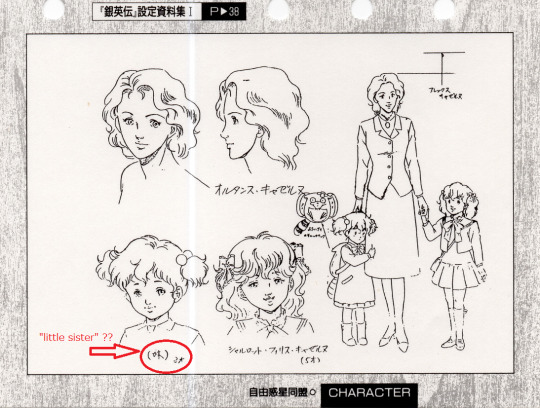
Another Cazellnu mystery: Why didn’t he bother to give his younger daughter a name? Did he use up all the female names he could think of on Charlotte Phyllis??
Sidney Sitolet

We’ve seen Fleet Admiral Sitolet (or Sithole, as it’s sometimes spelled, but come on, have some respect…) before, most recently when he was laying a major guilt trip on Yang about trying to resign from the military. In this episode he intensifies that guilt trip even further, telling Yang that he’s the literal only hope for preventing the whole military from falling into the hands of over-ambitious zealots eager to get everyone gloriously killed. Sheesh. I know that Sitolet is clearly demarcated as one of the Good Guys here—an older, more powerful, slightly sterner version of Yang who is also extremely practical about using his resources to try to minimize the damage caused by the continuing war. And Yang is one of those resources. I get it, but...this scene at the end of this episode just makes me want to write AU fanfic where Yang tells him to go to hell and moves to a nice mountain villa where he writes history books all day while Julian goes shopping at the local market for the best deals on high quality tea.

...What, a girl can dream, can’t she?
(From episode 3.)
Anyway, platitudes about patriotism and duty to crush the Evil Empire etc. won’t keep Yang in the military, but Sitolet is the one who knows exactly the kind of logic Yang finds inescapable. As much as it obviously frustrates and saddens him, Yang feels the burden of Sitolet’s expectations.
João Lebello
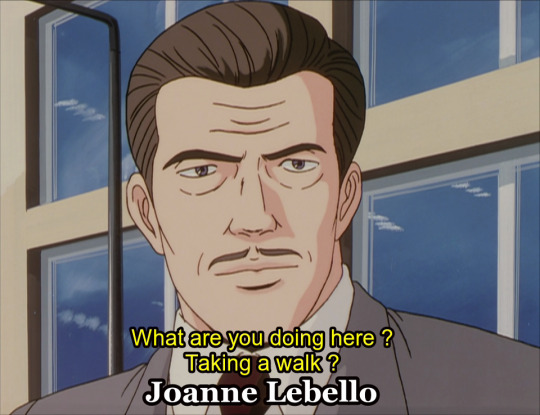
Or Joanne, sure, why not.
This is the first time we’re seeing Lebello, the current secretary of the treasury serving on the Alliance High Council. He’s a childhood friend of Sitolet’s, and their banter reminds me a bit of Yang and Cazellnu’s friendship.
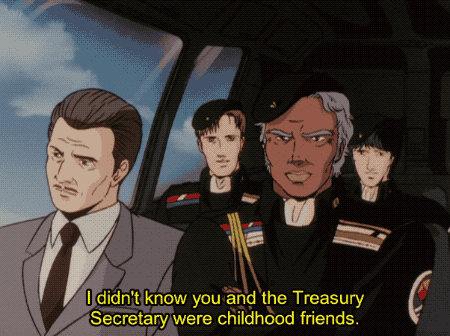
In the council’s deliberations, he’s the loudest voice speaking up against the invasion, on the grounds that their economy is already being stretched thin by the ongoing warfare and further military spending could lead to collapse. Unfortunately the counter of “eh we’ll just print more money” is persuasive to most of the council, who vote in favor of the invasion in hopes that a victory will improve their polling numbers. Let’s hear it for democracy!
Huang Louis
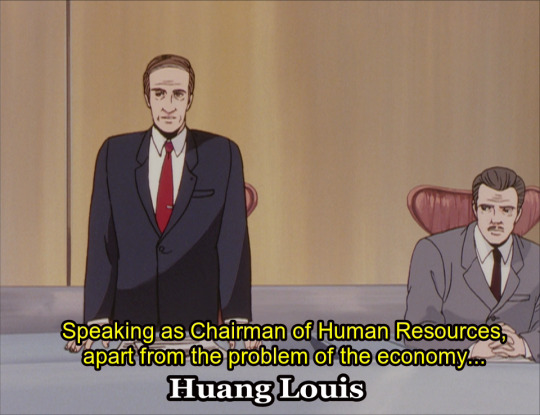
Like Yang, his family name is first; his given name is ルイ in Japanese, and I’ve seen it rendered as Rui, Lewi, or Louis.
The only other council member to speak against the invasion plan. Huang is quietly awesome; I don’t have a ton to say about him yet other than that, and the fact that I totally ship him and Lebello.

Huang/Lebello is pretty high up there on the LoGH Ships expanding brain meme.
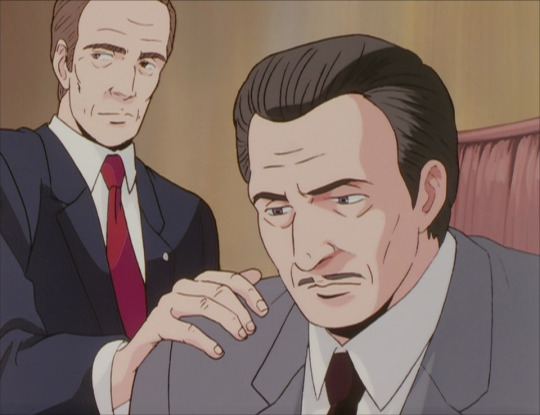
Cornelia Windsor

The token woman on the council, Windsor does a great job smashing the sexist stereotype that women are less likely than men to warmonger and advocate the deaths of millions of citizens. And she does so while reminding me so strongly of Dolores Umbridge that I’ve been trying to convince myself that J.K. Rowling must have watched at least the first twelve episodes of this show somehow.
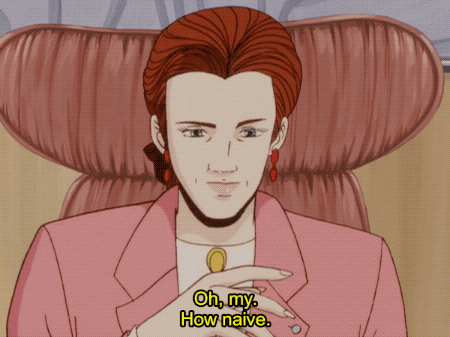
I mean, just look at that giggle.
There are three philosophies put forward in the council discussion: Lebello and Huang making practical arguments about the toll the war is taking on the Alliance economically and socially; Sanford, the head of the council, arguing that inaction is less likely to get them re-elected than a potential victory; and Windsor making the ideological case that war against the Empire is so righteous that no cost is too great to pay.
I’ll go out on a limb and say this show hasn’t been very subtle from the beginning about its distaste for people making arguments in favor of war and destruction on purely ideological or dogma-driven grounds. This stance seems mostly uncomplicated for now—pragmatism: good; blind idealism: bad—but so far the stars have aligned so that the characters spewing the dogmatic rhetoric are using it to push for increased death. It’s easy to roll our eyes at ideals of honor and glory in war; what about ideals like “try not to kill people if you don’t have to”? What if those go against the pragmatic arguments? We’ve already seen this tension a bit between Yang and Jessica, with his willingness to work within the military clashing with her ideals of pacifism, even though their ultimate goals align. In those cases there’s much less of a clear cut answer.
...But for now at least, we can all agree this Umbridge-wannabe person sucks.
Job Trunicht

(From episode 6.)
We’ve already heard plenty about Trunicht and we’ll hear plenty more, so I won’t dwell on him here. But a quick Fun Fact*: Yang, being generally a luddite, refused to even get a remote control for his TV (er sorry, SolidVision) for a long time, until Trunicht started appearing regularly on the news. Yang hated seeing Trunicht’s face for even a split second so much that he would bound up off the couch to turn it off as soon as Trunicht showed up. Of course Yang is incredibly lazy, and he finally realized that with a remote control he could remain on the couch and have to see Trunicht’s face for even less time, so he caved and bought one; and now he sits eagerly watching the news with the remote clutched in one hand, hoping he’ll have the chance to turn it off in disgust.
...Relatable.
*Source: Julian’s Iserlohn Diary, one of the side stories written by Tanaka. Yes yes our canon here is the anime not the books; but we get to pick and choose adorable details that we like, and I hereby make this one Official Icebergs Canon.
Andrew Fork

Speaking of characters spewing pompous platitudes about war, meet Andrew Fork, who I really really wish I could say was a hyperbolic caricature who could never exist or gain actual power in real life but………..*looks around* here we are I guess. Fork must be a historian who wrote his thesis on early 21st century Earth internet message boards, since he employs tactics like accusing anyone who questions the practical implementation of his ideas of Aiding the Other Side. I again can’t resist sharing a passage from the novel of another character describing Fork:
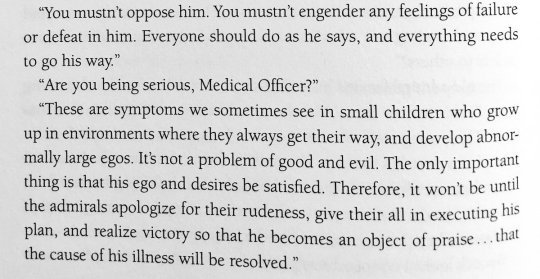
*thinking emoji*
*thinking emoji*
*thinking emoji*
I dunno it sounds familiar but I can’t place it...
Alexander Bucock

As you can tell by him giving Fork shit, Bucock is one of the more level-headed of the admirals. We’ll get to know him better in the future, so for now I’ll just mention that he’s awesome and him telling Fork that he’s impolite makes me happy. And that you shouldn’t get him mixed up with Lobos just because they both have white/gray hair and a mustache, as I may have done through pretty much the whole first season...
Quick Aside: Names
Cazellnu/Caserne/Caselnes? João/Joanne Rebelo/Lebello? Sitolet/Sithole/Shithole? Rui/Lewi/Louis? Fork/Falk? Bucock/Bewcock? Mittermeyer/Mittermeier, Reuental/Reuenthal, Mintz/Minci, Lap/Lapp/Shithole…??? It might have come to your attention by now that there is complete consensus about the spelling of essentially zero LoGH names.

You’d think “Jessica Edwards” would at least be free from controversy, but…..
(From episode 2.)
Given that there doesn’t seem to be one clearly “official” source, and that it’s 1600 years in the future, we’re not especially hung up on trying to be super authentic and picky with our spellings. Maybe Cazellnu’s distant ancestors who also managed military barracks were named Caserne, but the spelling got modified as humanity emigrated to the stars; it happens. Generally our policy is to spell things however we happen to feel like it, based on some combination of aesthetics and just what we’re used to, and to be as consistent as we can once we pick a spelling; but we’re not really in the business of trying to arbitrate which spellings are “correct.” There’s too much about LoGH that’s worth caring passionately about to spend that much energy on the names.

...Except Minci is still wrong, sorry animation notes that came with the laserdiscs.
Okay now, where were we…
Lazzll Lobos

...What, really? Lazzll, that’s what the subbers went with? Is that even a name? *quick Google search* No, no it’s not. Well, apparently it’s more commonly spelled Lassalle, but y’know what, I’m sticking with Lazzll god dammit. I make the rules here.
I don’t have anything to say about him beyond his name and that he is different from Bucock apparently.
And last but not...well okay maybe also least?
Adrian Rubinsky
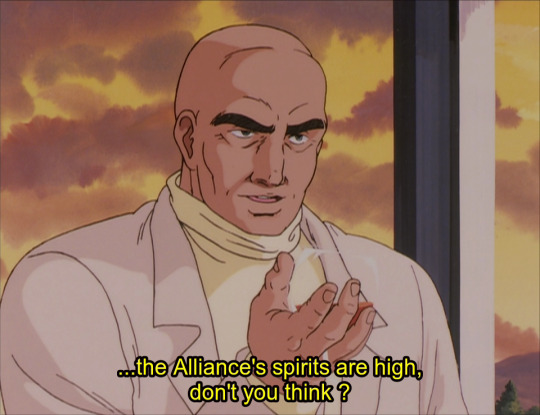
When we last mentioned Rubinsky he was musing about how to use Reinhard and Kircheis’s relationship to his advantage somehow; here we find him informing the Imperial High Commissioner to Phezzan about the Alliance’s impending invasion, which he learned about...somehow. His air is constantly that of one attempting to play puppet-master and sculpt the situation to his own advantage, although ostensibly he is only doing his duty here as an Imperial subject, Phezzan being officially a territory of the Empire. It’s on his information that the Imperial nobles set Reinhard’s fleet in motion to meet the Alliance invasion force, as Yang was afraid they would do.

We also very very briefly meet Dominique Saint-Pierré, a mistress of Rubinsky's, seen here pouring wine while both men leer at her; she has more power than this glimpse suggests, though, and the power struggles between her and Rubinsky are definitely the most interesting aspect of Rubinsky’s role in the story.
Phew! And with this we conclude the entry that will probably mention the highest number of canonically straight characters by name of any Icebergs post. I hope you got all that; yes this will be on the exam.
Stray Tidbits

I love the four-hour traffic jam caused by some intern feeding a corrupt string into a computer. I’ve mentioned how realistic the self-driving car system on Heinessen feels, and having it break down only adds to the realism.
So much for Yang’s optimism that capturing Iserlohn would lead to peace negotiations rather than an escalation of the war. Cracks are starting to show in Yang’s admiration of this whole “let the people control the government” thing, and I don’t blame him; especially since the Alliance “democracy” seems to involve decisions made by simple majority vote by an eleven-person High Council?? Umm?

The subs tried to make sense of this line by drawing a distinction that I don't think is there in the Japanese: Yang uses the same verb, "akusei o shite iru," for both governments, where akusei (悪政) is literally bad+government. My interpretation is that Yang is expressing frustration at the irony of people choosing to elect a government that nevertheless governs against their interest...but I guess I might be projecting.
I love this random shot of a Phezzani street. Most Obscure LoGH Love Triangle Award goes to the three teenagers on the right; I wonder which of them is the vertex?? This is the fanfiction the world demands.
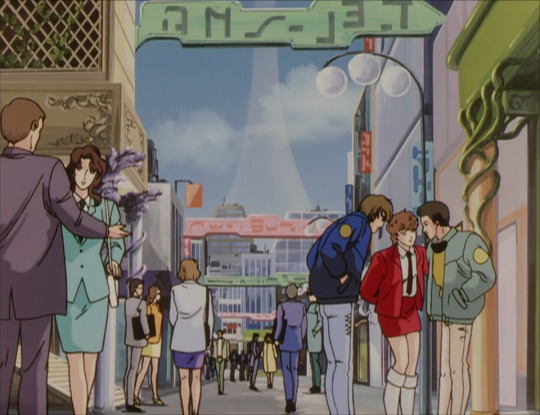
#Legend of Galactic Heroes#Legend of the Galactic Heroes#author: Rebecca#Alliance#Cazellnu#Hortence#Sitolet#Shithole#Lebello#Huang#Cornelia Windsor#Umbridge#Trunicht#Andrew Fork#Bucock#Lazzll#Rubinsky#Dominique#names#okay it's Mittermeyer not Mittermeier though#also Reuental#Elizabeth yelled at me for not clarifying those in the post oops#Huang/Lebello4eva
14 notes
·
View notes
Text
Future music historians will be like
“In the year 2016, wannabe auteur-musician Damien Chazelle disappointed music scholars when his love-letter to the city of Los Angeles, the movie-musical La La Land, opened and forever distorted what jazz was. Up until that point, jazz was seen as a purely American musical phenomenon with its roots in Black American culture. After the original song “City of Starts,” was unleashed on the public, white people, conforming to their historical role as the thieves of Black culture, assumed that this song was was “true jazz” (if ever such a concept existed) and derided anything sounding dissimilar as “not jazz” (NB: To maintain clarity of explanation, pre-2016 jazz will be referred to as “Black jazz” and post-2016 “jazz” as “Chazelle-style.”).
With the release of La La Land, there was a renewed, but limited, interest in Black jazz, which concerned the alt-Right staff of the Trump White House. In keeping with the administration’s policy of information distortion (”alternative facts”), record companies were forced under the amended Patriot Act, to recatalogue their old jazz recordings under the then (and still) obscure genre of “Ethnomusicological Data,” in an effort to better reflect “American values.” According to a diary recently discovered in the archives of the Library of Congress, the sound of the back-and-forth musical play of saxophones, trumpets, and other similar instruments “apparently carries the violence of the inner cities into living rooms of American suburbia, which make the Trump White House wary.” This diary is believed to have belonged to the director of the National Endowment of the Arts (NEA) during the Trump presidency (unfortunately, most of the records of NEA were destroyed in the final days of the Trump Administration as troops from California stormed the capital, so it is unknown to whom in particular the diary belonged).
Records located in the library of the NEA’s successor agency, the American Cultural Enrichment Center (NCEC), demonstrate how Chazelle-style was then used to promote the alt-Right agenda of the de facto president, Steve Bannon. Following the musical model established by La La Land’s “City of Stars,” composers commissioned by the Trump Administration wrote nationalistic songs with words by lyricists personally hired by Bannon. The thinking at the time was that the lack of musical distinction notable in Chazelle-style made it easy for casual listeners to fall into a trance of sorts while they gradually absorbed the jingoistic message. Since the lyrics of Chazelle-style had a tendency to be unforgettable and make little sense, only the most attentive listeners could discern the true intent of the songs.
As Chazelle-style gained popularity, the renewed interest in Black jazz ended and over the succeeding decades, recordings of Black jazz became more difficult to procure. Since their cultural value had been diminished, nobody thought to keep and preserve them. As a result, the catalogues of Miles Davis and Charlie “Bird” Parker have been completely lost, while the few remaining recordings Louis Armstrong are of such a poor quality, it is feared that preservation efforts will destroy them. Sheet music written by Davis and Parker is known to exist in private collections, but nobody alive has the ability to perform it as Black jazz would require. Meanwhile, “City of Stars” became the new American national anthem.”
31 notes
·
View notes
Text
How Rap Became The Soundtrack To Polish Nationalism
https://styleveryday.com/2018/02/11/how-rap-became-the-soundtrack-to-polish-nationalism/
How Rap Became The Soundtrack To Polish Nationalism
KRAKOW, Poland — Tadek spent his teens scouring record stores for albums by the Wu-Tang Clan and other hip-hop artists in Poland’s medieval center, Krakow.
Tadek, whose full name is Tadeusz Polkowski, discovered rap in the ’90s when it was still a new import to Poland; communism kept the country closed to Western pop culture until 1989. He started recording his own tracks at 16 under his nickname and became nationally known in his twenties as part of a wannabe gangsta rap–style group that recorded songs with names like “The Hard Life of a Street Rapper.”
So there was an outcry from the mainstream press when Tadek was invited to perform at the presidential palace in 2017 to mark the National Day for the Polish Language, a day historically used to honor Poland’s greatest writers.
The performance looked awkward for everyone involved. Tadek had traded the hoodie he often wore in his videos for a pair of chinos and a mustard V-neck sweater, both of which looked several sizes too large for his willowy frame. He kept his eyes tightly shut, as if trying to block out the rows of dignitaries in suits stiffly watching on.
But Tadek was given this platform precisely because he was no longer the man who’d tossed around phrases like “fuck the police” in his youth. That day he performed a song addressed to his wife — but it turned out to have a surprise message.
“We are getting stronger, the family is getting bigger, without man and woman — the final extinction. Our sons are so great that I want another child,” he rapped, before apologizing at the song’s end, “You have one rival, forgive me — it’s Poland!”
“Everyone who wants to control Poland … wants us to be weaker, wants us to be not proud of ourselves.”
Rappers like Tadek reflect just how deeply the past divides Poland today. He’s reinvented himself in recent years as part of a booming nationalist rap scene. His songs pay homage to the Poles who fought the Nazis in World War II and the communist government that followed, while taking jabs at the mainstream media, liberal politicians, and the European Union. His videos sometimes rack up millions of views on YouTube, and he plans to put out three new albums this year, now supported with a fellowship from the Ministry of Culture.
His trajectory reflects just how much nationalism has transformed Poland in recent years. The 2015 elections were won by an aggressive far-right faction, the Law and Justice Party, known as PiS for short. The PiS government has undermined the courts, refused to accept the refugees required under EU rules, and opened a culture war by claiming Poles have long been fed lies about their history.
Earlier this week, the president enacted a law that makes it illegal to say Poland shared any responsibility for the Holocaust. In World War II, the country lost 6 million people, half of whom were Jews. Lawmakers want Poland to be recognized as a victim of the Nazi invasion, but critics say the law would silence discussion of the way some Poles contributed to the Jews’ deaths.
One of the biggest tests of democracy in Europe is now playing out in Poland — and a drive to rewrite history is at its heart.
“Everyone who wants to control Poland … wants us to be weaker, wants us to be not proud of ourselves,” Tadek said in an interview with BuzzFeed News last month at his apartment overlooking the industrial valley that keeps Krakow smothered in a blanket of smog. “Pride gives people power to do something for your country.”
Tadek at home with his two sons.
Anna Liminowicz for BuzzFeed News
The night that Tadek’s parents brought him home from the hospital in 1982, he slept through riots outside their front door in which pro-democracy activists clashed with communist paramilitaries.
Shortly before Tadek was born, his father, a poet named Jan Polkowski, was imprisoned for seven months for his role in the pro-democracy Solidarity movement. After communism fell, Polkowski went on to serve in Poland’s newly democratic government and then a right-wing party that ultimately became part of PiS.
Tadek grew up surrounded by the memories of ancestors who’d fought for Poland. His parents hung a portrait of an ancestor who fought in a failed 1863 uprising against imperial rule by Russia. Tadek was told stories about his great-grandfather, who fought the Soviet Union after Poland became independent in 1918. He heard about his grandfather, one of thousands of Polish soldiers who fought the Nazis only to be sent to Soviet gulags by the Red Army as it established a communist puppet government at the end of the war.
So, Polkowski told BuzzFeed News, he was dismayed when Tadek grew into a rebellious adolescent drawn to “the way of expression that was used by black people in slums.” The music “did not talk about the reality he lived in,” he complained, and it seemed like a foreign subculture that “cuts you off from your roots.”
“It was also a rejection of my past,” Polkowski said.
Within a few years Tadek had started a group called Firma, rapping about weed and vodka and girls.
He saw Tadek as emblematic of a generation of young Poles raised under the liberal governments that ran Poland in the ’90s and brought it into the EU in 2004. He said Poland’s liberals only wanted to speak about the dark side of the country’s past and believed that “Polish identity should be dissolved into an EU identity.”
While his father wanted him to learn about Poland’s history, Tadek dedicated himself to mastering the audio equipment he’d inherited from an uncle. He recorded songs to cassette using samples from his PlayStation, recordings for children, and classical composers like Brahms and Beethoven. He was still in high school when he began performing live shows.
“I was fucking scared,” he said when recalling his first performance. “Everyone told me that I was really white in the face onstage.”
Within a few years Tadek had started a group called Firma, rapping about weed and vodka and girls. By the mid-2000s, they were playing around 50 concerts a year.
But everything changed for Tadek as he approached his thirties, when he decided to go on a self-improvement kick — to fight “not to be an idiot,” he said. His father had a library of more than 10,000 volumes, so he asked for some recommendations. And his father gave him books about Polish history.
Recounting this moment in his living room, which is decorated with the emblem of the uprising of Polish rebels that expelled Nazi troops from Warsaw at the end of World War II, Tadek grew angry about how much he hadn’t known about Polish history.
“Jewish people use the Holocaust for a lot of business.”
He discovered a past full of heroes who fought for the country’s independence — and decided their memory should be a resource for Poland today, not something to be ashamed of.
“What’s wrong? Why don’t we use it?” he said. Poland could have followed the model of the Jews, he said, who “built a lot of success on tragical history from years of war.”
“Jewish people use the Holocaust for a lot of business,” he said, like how “when you say something wrong about some Jewish people, it’s [called] anti-Semitism.”
For Tadek and many others, an example of the distortion of Polish history concerns the 1941 massacre of Jews in a village called Jedwabne. That July, a group of Poles herded the town’s Jewish residents into a barn and set it on fire as Nazi soldiers looked on.
youtube
youtube.com
Jedwabne was one of dozens of pogroms that broke out as the Nazis marched east across Poland, but a 2001 book by American historian Jan Tomasz Gross about the incident forced the first widespread discussion about how some Poles contributed to the death of Jews. A monument was built in Jedwabne, and two presidents apologized at commemorations a decade apart. But a government examination of the incident concluded in 2003 that Gross overstated the number who died and how many Poles participated. Many nationalists have since dismissed the book as a hit job designed to make Poland look bad.
Tadek claimed that Gross said, “Poles were the biggest killers of Jewish people during the war … that Polish people only wanted Jewish blood during the war.” In reality, Tadek said, thousands of Poles risked a death sentence by helping Jews escape the Nazis.
World War II wasn’t just a Jewish tragedy, he said. Around 2 million of the 6 million people believed to have been killed in Poland were ethnic Poles, and both Hitler and Stalin sought to destroy the Polish state. The Warsaw Uprising against the Nazis in 1944 was the largest underground revolt against German forces in any country during the war — there were plenty of stories of heroism, too.
“We were fighting during the Second World War,” Tadek said. “We were the biggest losers.”
Tadek came to believe that powerful interests were trying to keep the truth of the past from Polish citizens.
He pointed to members of the old Communist Party who’d become part of the center-left party that led Poland into the EU, who he believed were trying to keep the party’s crimes buried. Other former communists have become powerful in the media, like Jerzy Urban, who was the press secretary for Poland’s last communist leader and now edits a weekly paper. Many foreign companies are now big players in the Polish economy, including German firms that profited during the Nazi era, such as Allianz insurance.
“If you want someone to be your slave, you don’t want him to be intelligent, smart,” he said. “How the fuck did it happen — people don’t know about the biggest World War II heroes?”
Anna Liminowicz for BuzzFeed News
It’s not just the memory of World War II and communism that divides the Poles.
In 2010, President Lech Kaczyński and several other top officials died when a plane crashed in the Russian city of Smolensk as they were traveling to the site where the Soviet army massacred Polish officers at the end of WWII. Competing accounts of what happened that day are so far apart that they exist in entirely separate universes.
The official investigation by aviation experts and the government of liberal Prime Minister Donald Tusk established that it was an accident caused by a rushed landing attempt in bad weather. But the leader of PiS — the dead president’s identical twin brother, Jarosław Kaczyński — was convinced it had been an assassination by Russia and that Tusk was covering it up.
PiS hammered on the claim, organizing monthly vigils calling for the “truth” about Smolensk, while a new network of right-wing media outlets spread the conspiracy allegations. They claimed Tusk was a pawn of a hostile power, and charged him with treason when he later left Poland to become president of the European Council. By 2015 nearly a quarter of Poles believed there was a cover-up of Smolensk.
That’s the year PiS won a majority in Parliament promising to restore Poland’s pride and to keep out Muslim refugees. And it solidified its power with what opponents say is sustained assault on the media and the historical record.
If you think that the previous government covered up a Russian assassination of Poland’s president, then it’s not a stretch to believe that authorities will lie about anything. And there was a new network of right-wing news sites and social media accounts to convince the public they had long been duped.
“We were fighting during the Second World War. … We were the biggest losers.”
For PiS members, the Smolensk cover-up was part of a much wider conspiracy by pro-European governments to lie about Poland’s history so the country would be ripe for foreign exploitation. They claimed liberals wanted Poles to be ashamed of their past so they would not fight back.
PiS’s Andrzej Duda, who is now Poland’s president, said his liberal predecessor’s apology for the Jedwabne pogrom “destroys historical memory.” A former PiS parliamentary candidate organized a nationwide hunger strike when the education ministry rolled out a more flexible curriculum in 2012 that required fewer hours of history.
Tadek’s first historically themed album came out at the height of this furor. He called it An Inconvenient Truth, because, he said in the title song, it carries a message for “those scumbags that destroy this country from the inside.”
“There is no consent to rob young Poles of knowledge of their ancestors,” he said in lyrics addressed to then–prime minister Tusk in a song about the curriculum overhaul. “Maybe he forgot that he is the prime minister? … Do they love their country or Brussels more?”
The album’s biggest single was about the so-called Cursed Soldiers, Polish units who fought the Nazis and hid in the forests when the Soviets occupied Poland in 1945; they fought until the Red Army finally wiped them all out. It immediately racked up thousands of views on YouTube, and today it has been watched more than 4 million times in various versions. That number is more than one-tenth of Poland’s entire population.
One track told the story of Danuta Siedzikówna, who joined the Polish resistance as a nurse and supported the Cursed Soldiers with medical supplies until she was arrested and executed by communist forces. Another told the story of Witold Pilecki, a soldier during World War II who spent two years organizing a secret resistance inside the Nazi concentration camp at Auschwitz. He escaped in 1943 and fought with Polish forces during the 1944 uprising in Warsaw, before being arrested and executed in 1948 as a Western spy by the communist regime.
“Why did they not teach me about you in school?” Tadek lamented. “Today, the media and political elites — as if they are Polish — are constantly striving to deceive history.”
Tadek Polkowski in his the apartment where he grew up in Krakow, Poland.
Anna Liminowicz for BuzzFeed News
This led to the busiest time of Tadek’s career, when he was playing around 100 concerts a year. He also began working with a Krakow museum dedicated to Poland’s homegrown World War II resistance, and the city’s symphony orchestra organized a concert of classical arrangements of his music. Then came government honors.
Promotional copies of Tadek’s An Inconvenient Truth were distributed by Magna Polonia, a publication that is now a Breitbart-esque online portal run by a group called the National Radical Camp. Known by its Polish initials ONR, it takes its name from a right-wing group that sought an ethnically pure Poland in the 1930s.
ONR members have been convicted under Poland’s anti-fascism law for making Hitler salutes. But in 2010, a procession the ONR co-organized in Warsaw to mark Poland’s Independence Day became the focal point for the growing nationalist fervor and drew thousands.
“You have one rival, forgive me — it’s Poland!”
Tadek endorsed the march in 2012, and said he believed that mainstream media coverage of the event was propaganda by left-leaning stations to make nationalists look bad. Last year’s march saw organizers describe themselves as “racial separatists,” openly use banners with slogans like “All Different, All White,” and give prominent speaking spots to self-proclaimed fascist leaders from other countries.
Tadek distances himself from the overtly racist parts of the movement but seems unaware of its reach. He said he’s never attended the march, but was certain that “most of the people who go … are just normal people.” He seemed surprised when told that its organizers described themselves as “authoritarian” and that some marchers had used racist slogans and banners with a Nazi emblem. These “are things that should never happen,” he said.
The country’s right-wing media, which now includes the state-owned public television network as well as a broadcast empire owned by a powerful Catholic priest, seems to ignore or denies these facts. These details are emphasized by Poland’s major independent broadcaster, TVN, which is owned by a US company and dismissed by the right as a foreign agent.
Some nationalist rappers have zealously embraced their role as propagandists; some even call for violence. A group of rappers from the industrial city of Łódź were reportedly arrested in 2016 with a cache of weapons after releasing a video calling for a “Polish jihad” against Muslim immigrants.
Despite Tadek’s disavowal of the nationalist rap scene’s racist elements, he can’t escape them. When you watch Tadek’s videos on YouTube, the site algorithm quickly suggests tracks by one of the more extreme right-wing rappers, Basti, whose songs include “Stop Islamizing Europe” and who titled one of his albums Hate Speech.
“Our main role is to build good feelings about Poland, not bad feelings about the others,” Tadek said.
But the transformation of history into a weapon by the nationalist movement has helped Poland’s far right radicalize faster than seemed possible even a few years ago, said Dariusz Stola, director of the POLIN Museum of the History of Polish Jews.
When the museum opened five years ago, he said, “I didn’t expect that you would see neo-fascists … marching in the main street of several cities or present in church with their flags.”
Nationalists were very shrewd to turn every discussion of history into a test of patriotism, he said.
“It’s horrible and it will bring violence sooner or later,” he said. “Someone will die.” ●
0 notes
Text
What would you like to see me do next?
Which series would you like me to take screenshots of next? Message me or leave a vote in the inbox! I’ll decide on something tomorrow morning!
2 notes
·
View notes
Text
An unfortunate heads up
So, this blog will soon be moving to a new blogstay. I have been operating on a school iPad, and since it is my graduating year, I must return it this Friday. I won’t deactivate this blog, but I’ll be making a new blog some time next week or when I get the chance. I just wanted to say that you all are wonderful. The community of Extra Credits and History is a true gem, and I want to give shoutouts to @clockworkdaniel @doublo @kowalaecstaty @shlippitydop and especially @extracreditsblog for their support. This is not to say I do not appreciate the rest of you grand followers. When I move to the next blog, I’ll hold an open vote for the next series. Until then, stay strong and keep pursuing knowledge, scholars.
16 notes
·
View notes
Text
Uprising
Turns out, there are two more stories in this universe. This is one. Stay tuned for the other one!
Al is starting early.
Tomorrow’s going to be the day, but his special talents make things… a little more complicated.
The Men of Letters won’t know what hit them.
He’ll confuse them more than he did Mick, the poor guy. He didn’t realize at the time; he really thought he was doing him a favour when he showed him his parents.
This time, it’s supposed to hurt.
Men are so easy to read once they let their guard down; once they are asleep.
He has never shared the sadism of his immediate family, but he can’t help but admit a certain... satisfaction. They will hurt, but that’s a price he’s more than willing to pay.
He enters their drams. One by one.
It’s easy. One of them suffers from claustrophobia, for crying out loud. Up and down a creepy dark corridor it is. All night.
Another one? Spiders? Easy as pie.
He stops when it comes to the boss of that particular camp, though.
Another orphan.
Abandonment.
But Al steels his heart.
They had all the information Mick has, and more. They could have just another path, like he did.
But they are still ready to kill every monster in this country.
None of them will be well rested tomorrow when the troop attacks.
One of the guys Al has to deal with is particularly nasty. He enjoys killing way too much. Probably got along great with that Ketch fellow.
Time to make him feel what it is like, being torn apart.
By sunrise, he has them all awake, scared, worried, panicking, just like he wanted.
Time to call Kate.
He has made them so tired and paranoid, he gets the message that they have been dealt with only one hour later.
Al grins.
Now, as long as the Winchesters are alright, everything will work out fine.
Water is patient.
Water is wild.
Water has no time.
Water waits too long.
Water can never be stopped.
Mel likes to think she shares that characteristic with her element .
She’s sitting at the bottom of the lake she found near her cousins, concentrating, almost every last bit of her focused in a different drop, a different location.
They need someone to be their eyes, all of their eyes.
Mel is coordinating with her brethren. All of them have been sick of being hunted like animals for a long time, and most were eager to learn about the new path that has opened for them.
They have their own plans for the rest of the planet.
Once empty lakes must be filled again. The world must find its balance again.
But that’s for later.
Now, what matters is that today works out. That today, the Men of Letters get captures as they deserve to be.
Be careful, be vigilant, she sings through the waves. Stay strong. It will all be over soon. We will win.
If only she could see into the Men of Letter’s base, but it’s dry, so dry, too dry to live.
She hopes Mick is alright. They have a future. If he survives.
And then, just for a second, a tiny fragment of a moment, she is there. In the base. Mary Winchester is pointing a gun at Crowley. Everyone else looks terrified.
She is too. But she is water, she is tempestuous, she is calm, and she knows what has to be done.
Water always knows.
The drop she sees through falls down on Mary Winchester’s face.
She’ll never know how it got there.
But she knows it was the plan of the universe all along.
As long as it helps the Winchester, she doesn’t mind at all.
She knows they have won when a coin falls down into a stream not far from the best.
“The best news, Mel”.
Even though Dean can’t see her, she grins.
Claire has talked Jody into letting her help out. True, Jody never agreed to her actually being part of the action, but this is the life she has chosen.
She’s ready to fight.
For Cas. For Dean. For Sam.
And the woman in the pants suit isn’t much of a danger, really. She has her unarmed within seconds.
“Why are you doing this?” she hisses while she ties her up.
“Because you went against my family” is all she says.
They don’t need long to take over. They might be well-trained, but they are still stupid in certain regards.
“You’re really good for your age” a young shapeshifter named Tony tells her, grinning.
“I could say the same. Or are you actually an old hag masquerading as a teenager?”
He laughs.
“And a sense of humour. I like it.”
“Why are you talking to that abomination – “ one of their prisoners starts to shout.
“Unlike you, he actually knows how to talk to a lady” she tells him. “That’s why.”
The pack surrounds the house.
They are just waiting for Garth to give the signal.
Dean and Cas have chosen a good day. They’re right in the middle of their cycle.
Strong enough to attack, but not wolfing out.
“Alright guys. Here goes. For the Winchesters.”
“For the Winchesters” his family whispers back.
They were right.
The Men of Letters are woefully unprepared, and no amount of screaming “The werewolf protocol!” can help them.
“You really thought this would work? Taking over?” he asks.
“We’re not just some wannabe hunters you can shove around and order to behave”.
“Let me go, you mutt!” a woman shrieks.
He laughs.
They are everywhere.
Monsters. Hunters. Sometimes working together, sometimes separate.
But all with one goal in mind.
America will be free again, and it will be the first country to have peace between humans and monsters. Once and for all.
In a way, they must be thankful to the Men of Letters. But they’ll leave it to historians and other cynics to eventually point it out.
Instead, they’ll fight and fight and fight until they have won.
And they do.
A new dawn beacons the next day.
One in which they don’t have to be afraid anymore.
0 notes
Text
Finally back!
After being gone for about 3 months, I finally have this blog back up and running on my iPad! I’m sorry it took so long, but as soon as I find a series to go through, I’ll be posting in no time!
1 note
·
View note
Text
Results are in!
With the only vote, I will be doing the Sengoku Jidai series next! Expect posts to start showing up later today!
3 notes
·
View notes